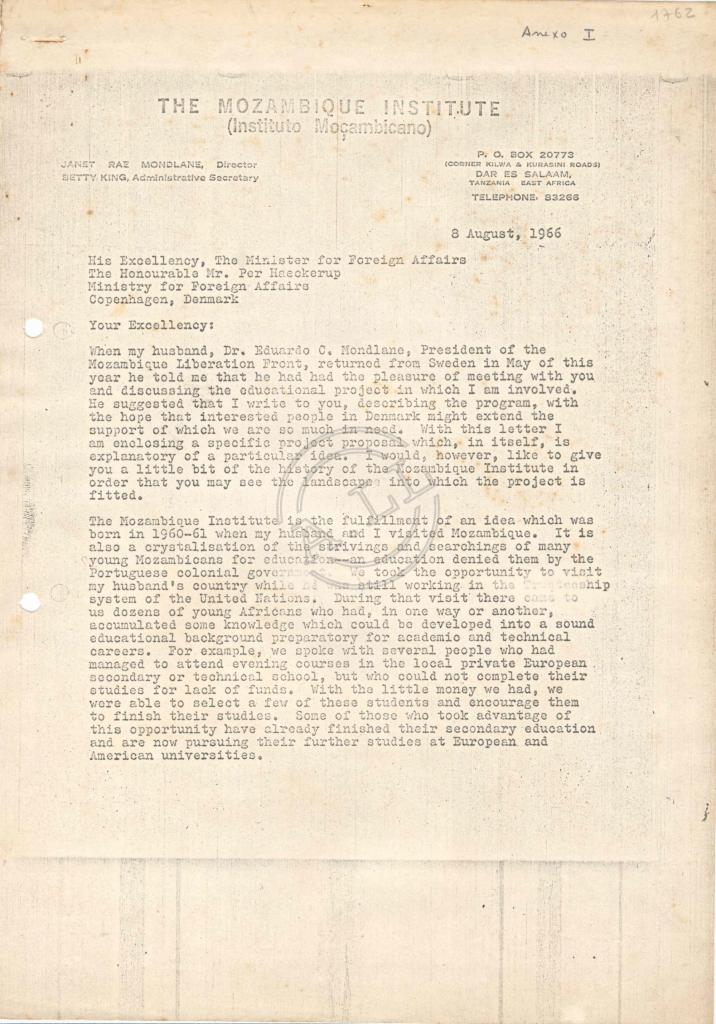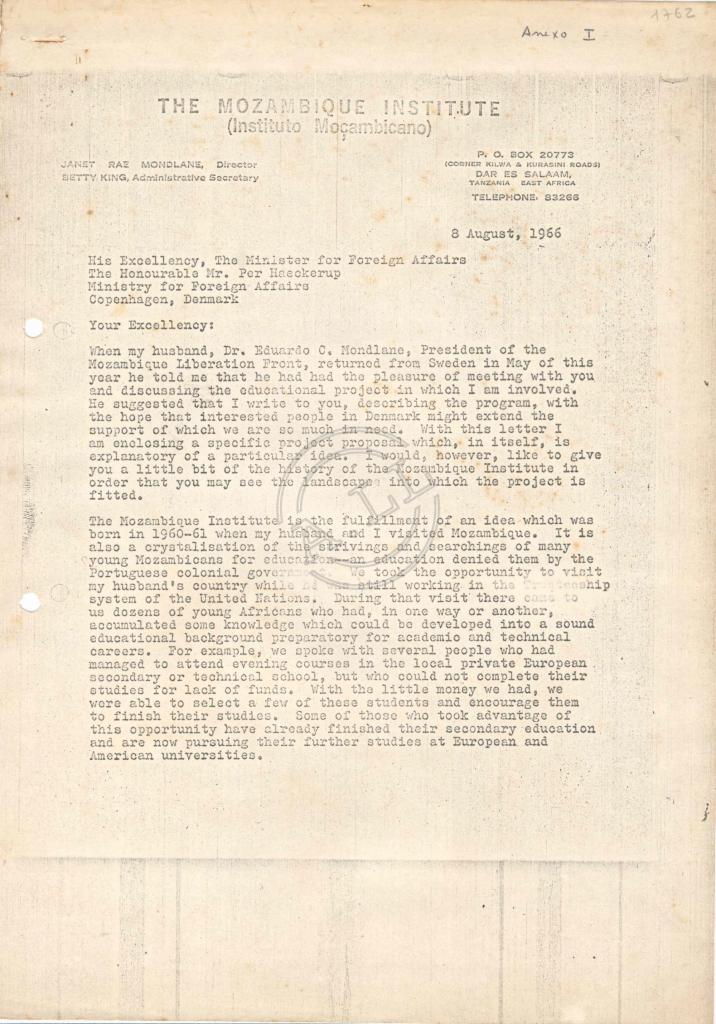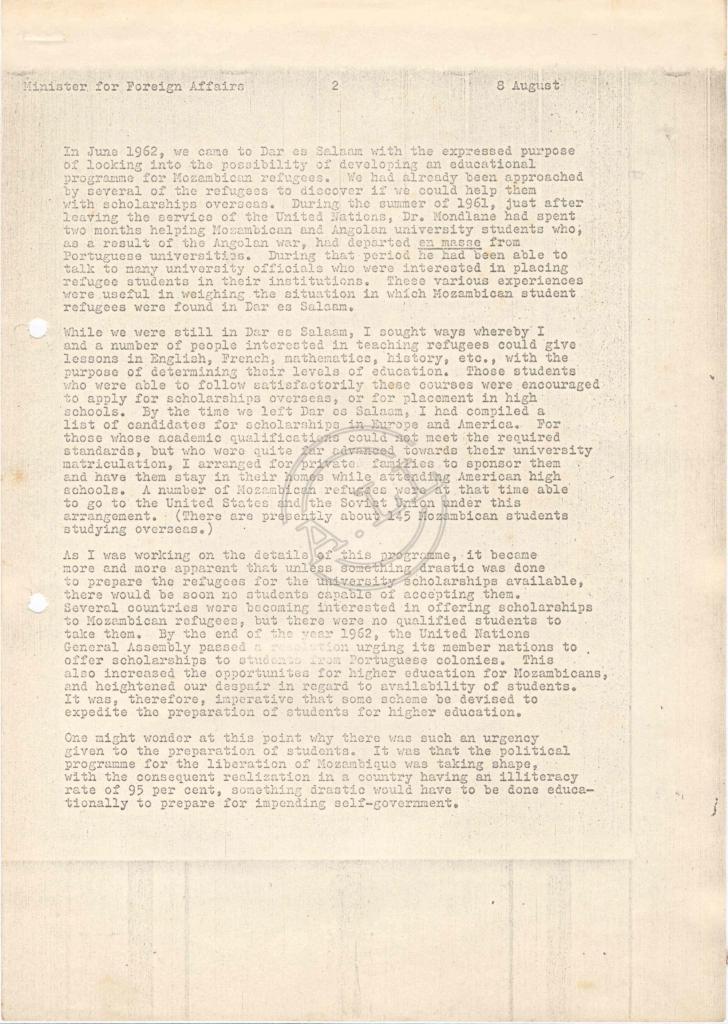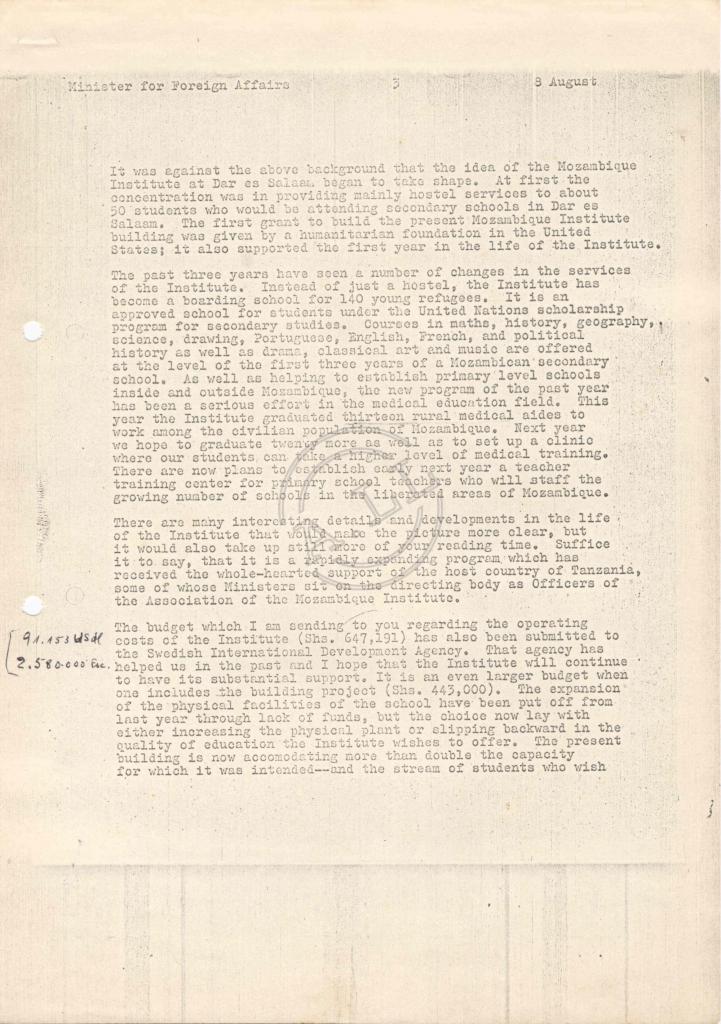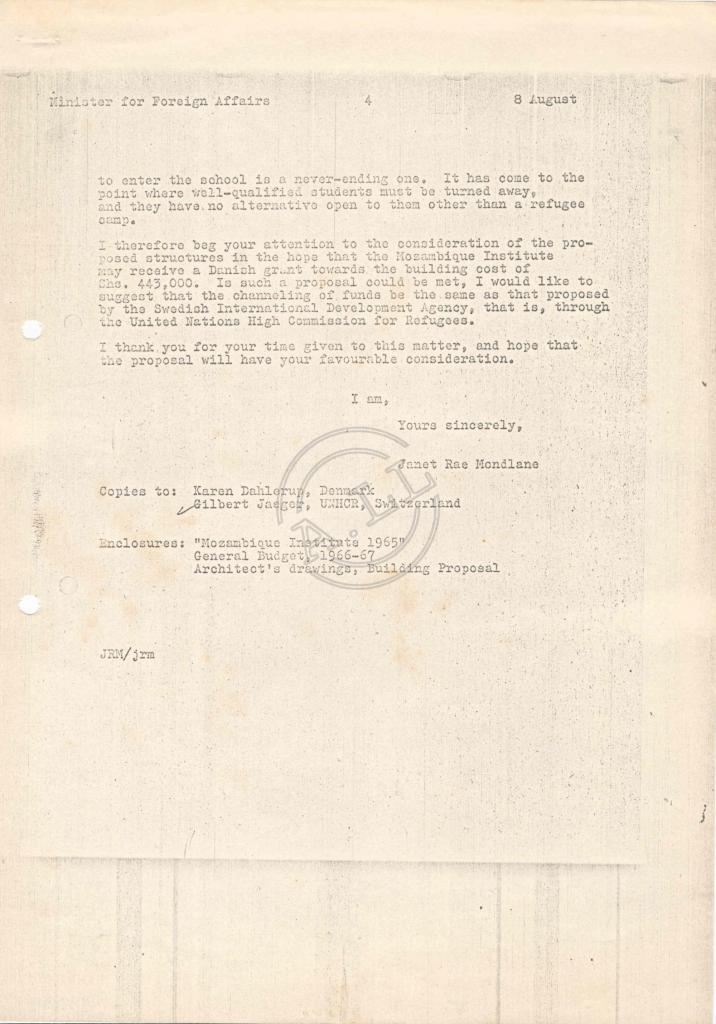Cota
0085.000.007
Tipologia
Correspondência
Impressão
Dactilografado
Suporte
Papel Comum
Remetente
Janet Mondlane, Mozambique Institute
Destinatário
Ministro dos Negócios Estrangeiros da Dinamarca
Locais
Data
Idioma
Conservação
Bom
Fundo
Imagens
4
THE MOZAMBIQUE INSTITUTE
(INSTITUTO MOÇAMBICANO)
JANET RAE MONDALANE, Director
BETTY KING, Administrative Secretary
P.O. BOX 20773
(CORNER KILWA & KURASINI ROADS)
DAR ES SALAAM,
TANZANIA EAST AFRICA
TELEPHONE: 83266
8 August, 1966
His Excellency, The Minister for Foreign Affairs
The Honourable Mr. Per Haeckerup
Ministry for Foreign Affairs
Copenhagen, Denmark
Your Excellency:
When my husband, Dr. Eduardo C. Mondlane, President of the Mozambique Liberation Front, returned from Sweden in May of this year he told me that he had the pleasure of meeting with you and discussing the educational project in which I am involved. He suggested that I write to you, describing the program, with the hope that interested people in Denmark might extend the support of which we are so much in need. With this letter I am enclosing a specific project proposal which, in itself, is explanatory of a particular idea. I would, however, like to give you a little bit of the history of the Mozambique Institute in order that you may see the landscapes into which the project is fitted.
The Mozambique Institute is the fulfillment of an Idea which was born in 1960-61 when my husband and I visited Mozambique. It is also a crystallization of the strivings and the searchings of many young Mozambicans for education - an education denied them by the Portuguese colonial government. We took the opportunity to visit my husband’s country while he was still working in the (indistinto) system of the United Nations. During that visit there came to us dozens of young Africans who had, in one way or another, accumulated some knowledge which could be developed into a sound educational background preparatory for academic and technical careers. For example, we spoke with several people who had managed to attend evening curses in the local private European secondary or technical school, but who could not complete their studies for lack of funds. With the little money we had, we were able to select a few of these students and encourage them to finish their studies. Some of those who took advantage of this opportunity have already finished their secondary education and are now pursuing their further studies at European and American Universities.
In June 1962, we came to Dar es Salaam with the expressed purpose of looking into the possibility of developing an educational program for Mozambican refugees. We had already been approached by several of the refugees to discover if we could help them with scholarships overseas. During the summer of 1961, just after leaving the service of the United Nations, Dr. Mondlane had spent two months helps Mozambican and Angolan university students who, as a result of the Angolan war, had departed en masse from Portuguese universities. During that period he had been able to talk to many university officials who were interested in placing refugee students in their institutions. These various experiences were useful in weighing the situation in which Mozambican student refugees were found in Dar es Salaam
While we were still in Dar es Salaam, I sought ways whereby I and a number of people interested in teaching refugees could give lessons in English, French, mathematics, history, etc., with the purpose of determining their levels of education. Those students who were able to follow satisfactorily these courses were encouraged to apply for scholarships overseas, or for placements in high schools. By the time we left Dar es Salaam, I had compiled a list of candidates for scholarships in Europe and America. For those whose academic qualifications could not meet the required standards, but who were quite far advanced towards their university matriculation, I arranged for private families to sponsor them and have them stay in their homes while attending American high schools. A number of Mozambican refugees were at that time able to go to the United States and the Soviet Union under this arrangement. (There are presently about 145 Mozambican students studying overseas.)
As I was working on the details of this programme, it became more and more apparent that unless something drastic was done to prepare the refugees for university scholarships available, there would be soon no students capable of accepting them. Several countries were becoming interested in offering scholarships to Mozambican refugees, but there were no qualified students to take them. By the end of the year 1962, the United Nations General Assembly passed a resolution urging its member nations to offer scholarships to students from Portuguese colonies. This also increased the opportunities for higher education for Mozambicans, and heightened our despair in regard to availability of students. It was, therefore, imperative that some scheme be devised to expedite the preparation of students for higher education.
One might wonder at this point why there was such an urgency given to the preparation os students. It was that the political programme for the liberation of Mozambique was taking shape, with the consequent realization in a country having an illiteracy rate of 95 per cent, something drastic would have to be done educationally to prepare for impending self-government.
It was against the above background that the idea of the Mozambique Institute at Dar es Salaam began to take shape. At first the concentration was in providing mainly hotel services to about 50 students who would be attending secondary schools in the Dar es Salaam. The first grant to build the present Mozambique Institute building was given by a humanitarian foundation in the United States; it also supported the first year in the life of the Institute.
The past three years have seen a number of changes in the services of the Institute. Instead of just a hotel, the Institute has become a boarding school for 140 young refugees. It is an approved school for students under the United Nations scholarship program for secondary studies. Courses in maths, history, geography, science, drawing, Portuguese, English, French, and political history as well as drama, classical art and music are offered at the level of the first three years of Mozambican secondary school. As well as helping to establish primary level schools inside and outside Mozambique, the new program of the past year has been a serious effort in the medical education field. This year the institute graduated thirteen rural medical aides to work among the civilian population of Mozambique. Next year we hope to graduate twenty more as well as to set up a clinic where our students can take a higher level of medical training. There are now plans to establish early next year a teacher training center for primary school teachers who will staff the growing number of schools in the liberated areas of Mozambique.
There are many interesting details and developments in the life of the institute that would make the picture more clear, but it would also take up still more of your reading time. Suffice it to say, that it is a rapidly expanding program which has received the wholehearted support of the host country of Tanzania, some of whose Ministers sit on the directing body as Officers of the Association of the Mozambique Institute.
The budget which I am sending to you regarding the operating costs of the Institute (Shs. 647,191) has also been submitted to the Swedish International Development Agency. That agency has helped us in the past and I hope that the institute will continue to have its substantial support. It is an even larger budget when one includes the building project (Shs. 443,000). The expansion of the physical facilities of the school have been out off from last year through lack of funds, but the choice now lays with either increasing the physical plant or clipping backward in the quality of education the Institute wishes to offer. The present building is now accommodating more than double the capacity for which it was intended - and the stream of students who wish to enter the school is a never-ending one. It has come to the point where well-qualified students must be turned away, and they have no alternative open to them other than a refugee camp.
I therefore beg your attention to consideration of the proposed structures in the hope that the Mozambique Institute may receive a Danish grant towards the building cost of Shs. 443,000. Is such a proposal could be the same as that proposed by the Swedish International Development Agency, that is, through the United Nations High Commission for Refugees.
I thank you for your time given to this matter, and hope that the proposal will have your favourable consideration.
I am,
Yours sincerely,
Janet Rae Mondlane
Copies to: Karen Dahlerup, Denmark
Gilbert Jaeger, UNHCR, Switzerland
Enclosure: “Mozambique Institute 1965”
General Budget, 1966-67
Architect’s drawings, Building Proposal
JRM/ jrm
Fotocópia da Carta do Mozambique Institute (Dar-es-Salaam), assinada por Janet Mondlane, ao Ministro dos Negócios Estrangeiros da Dinamarca (Anexo I)
A publicação, total ou parcial, deste documento exige prévia autorização da entidade detentora.
